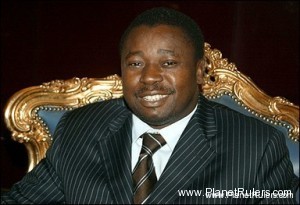Faure Essozimna Gnassingbé, President of Togo (re-elected on Jan 22, 2020 with 72.4% of the vote)
Update: On Apr 25, 2015, he is re-elected with winning 58.8% of the vote. Turnout 60%).
Faure Essozimna Gnassingbé (born June 6, 1966), also known as Faure Eyadéma, has been the President of Togo since May 4, 2005; he was previously president for twenty days from February 5 to February 25, 2005. He is the son of the late President and dictator Gnassingbé Eyadéma, and was named leader of Togo following his father’s death. He resigned on February 25, prior to a presidential election on April 24, which he won; he was subsequently sworn in as president again. However, the opposition alleged massive fraud.
Background
Born in the town of Afagnan, Faure Essozimna Gnassingbé studied in Paris and obtained Master of Business Admnistration degree from The George Washington University, USA. He was a deputy to the National Assembly of Togo for Blitta, coordinator of the commission in charge of privatization and served as Minister of Mines and Telecommunications from July 29, 2003 to February 2005. He has a reputation of a skilled politician. Since coming to power, he has been working tirelessly to reconcile Togolese politicians and revive the relations with European Union. He has 8 kids from different women.
Politics
The possibility of Gnassingbé’s appointment as President to succeed his father was already being discussed because of his father’s chronic ill health when, in December 2002, Gnassingbé Eyadéma amended the constitution to lower the minimum age for the president from 45 years to 35 years (Faure Gnassingbe was 35 at the time). However his death in February 2005 was sudden.
According to the Togolese constitution, after the president’s death, Fambaré Ouattara Natchaba, the speaker of parliament, was supposed to become acting president. However, at the time of Eyadéma’s death, Natchaba was out of the country, and Faure Gnassingbé was sworn in as acting president to “ensure stability”. Many still believe that Natchaba did not want to come back to Togo because the army wanted him to resign his position and allow Faure to legally take over. This prompted the African Union to denounce Faure’s assumption of power as a military coup. But Fambaré Ouattara Natchaba ultimately returned to reclaim his preeminence in the ruling party. He represented the party at political talks in Ouagadougou (Burkina Faso).
Legitimacy
A day after his father’s death, parliament received clear instructions to dismiss Natchaba and elect Gnassingbé in his place, which would legalize his succession; French law professor Charles Debbasch served as mastermind of the entire operation. Gnassingbé’s election was unanimously approved by the deputies who were present in parliament at the time, a parliament that was elected in an election boycotted by the opposition. The members of Gnassingbe’s party did not want to challenge the army’s choice. The parliament also eliminated a constitutional requirement that elections be held within 60 days of the president’s death, enabling the younger Gnassingbé to rule until the expiration of his father’s term in 2008.
Under pressure from others in the region, and particularly Nigeria, later in February 2005 Gnassingbé announced that new elections would be held within 60 days, but said that he would remain in office in the meantime. However, on February 21, the Togolese National Assembly reversed some of the constitutional changes that it had made so as to allow Gnassingbé to assume power, although it did not instruct him to resign. This was construed as a way of pressuring him to stand down with dignity. To change the constitution during a period of transition was itself an unconstitutional act, but this did not deter Faure’s allies.
On February 25, Gnassingbé was nominated by delegates of the ruling party, the Rally for the Togolese People, as the party’s presidential candidate. He was also chosen as head of the party. Many still wonder how Gnassingbe was nominated since the convention was kept secret. Shortly afterwards, he announced that he would step down as president during the interim period. Bonfoh Abbass, a former sports instructor, was appointed by the National Assembly to replace him until the election on April 24, 2005. Bonfoh served as a puppet under the military elite and the Gnassingbe family. Faure Gnassingbe competed with the main opposition candidate, 74-year-old Emmanuel Bob-Akitani, a retired engineer of the state owned mining company who is the second most important person in the opposition coalition after Gilchrist Olympio. Olympio could not take part in the election, since the constitution requires that any candidate must have lived for at least 12 months in Togo, and Olympio had been in self imposed exile to create a myth around himself. He regularly visits Togo where he holds political meetings. Olympio has a house in Ghana, where his mother comes from, but not in Togo. Some believe that may be the reason why he has not settled in Togo.
In the election, Gnassingbé took slightly more than 60% of the votes according to official results; the election was followed by accusations of fraud by the opposition and violence which led to a number of deaths in both camps, but Gnassingbé was sworn in as president on May 4, 2005.


